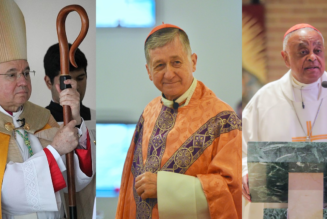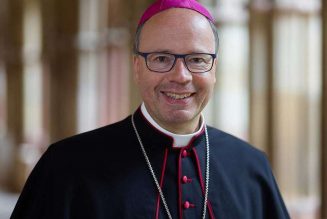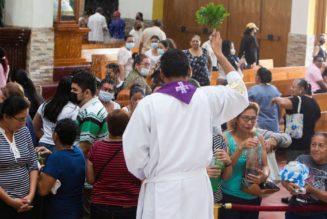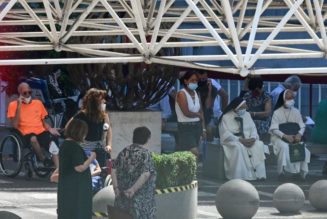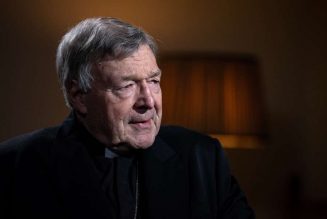In his Christmas message at the midday “Urbi et Orbi” blessing on Christmas Day, Pope Francis speaks of how the Child Jesus reveals God’s tender love for each one of us, which brings about “the joy that consoles hearts, renews hope and bestows peace.” He prays for world peace and calls for every effort to stop violence and help those who are suffering.
By Thaddeus Jones
Greeting the crowds gathered in Saint Peter’s Square from the central loggia of Saint Peter’s Basilica, Pope Francis offered his traditional good wishes on this Christmas Day with a message followed by his solemn “Urbi et Orbi” blessing, to the city and the world.
The Pope said we look to the birthplace of Jesus in Bethlehem during these times, sadly marked by “sorrow and silence.” Yet the birth of the Saviour there and the proclamation of the angel, “To you is born this day in the city of David a Saviour, who is Christ the Lord,” give us great hope as “the Lord has been born for us…the eternal Word of the Father, the infinite God, has made His home among us.”
Good news that changed history
Introducing his message, the Pope said the “good news of great joy” we celebrate is the “sure promise of an unprecedented gift: the hope of being born for heaven” as the Lord’s birth reveals God’s tender love and that Jesus “gives us ‘power to become children of God.’”
God’s light dispelling the darkness
Despite the “deep shadows” covering Bethlehem today, “an undying flame has been lighted” the Pope underscored, as God’s light has overcome the darkness.
The innocent victims of today
Following the birth of the Saviour came the slaughter of the innocents, the Pope recalled, and he remembered the innocents, the “little Jesuses” of today, who are victims “in their mothers’ wombs, in odysseys undertaken in desperation and in search of hope, in the lives of all those little ones whose childhood has been devastated by war.”
“Yes” to the Prince of Peace
We must say “yes” to peace and “no” to war the Pope decried, as every war marks “a defeat without victors, an inexcusable folly.” He also called for a “no” to weaponry given that with human weakness we can often end up using it for war sooner or later.
Peace is even more difficult, he observed, “when arms production, sales, and trade are on the rise” and public funds spent on arms can come at the expense of bread for the hungry. He decried “the interests and the profits that move the puppet strings of war.” And these must be brought to light, “talked about and written about,” he emphasised, since many have no idea how much of their public funds are being spent on weapons, whereas they should be informed.
He prayed that “with God’s help” may we make “every effort” for the day when “nation shall not lift up sword against nation.”
An end to violence in the Holy Land
Looking at parts of the world where peace is distant, the Pope prayed for an end to the war devastating the lives of people in Israel and Palestine. He offered his consolation to the people of Gaza and the entire region and in particular the Christian communities.
He said his “heart grieves for the victims of the abominable attack of 7 October,” and he repeated his “urgent appeal for the liberation of those still being held hostage.”
The Pope pleaded for “an end to the military operations with their appalling harvest of innocent civilian victims” and called for “a solution to the desperate humanitarian situation by an opening to the provision of humanitarian aid” in Gaza.
With an end to the violence, the Pope expressed hopes that sincere and “persevering dialogue” with strong political will and international support can lead to resolving the “Palestinian question.”
Peace for our world
The Pope named other nations struggling to arrive at peace and stability, mentioning war-torn Syria, Yemen, and struggling Lebanon, assuring all the people of his prayers for their well-being. He implored peace for Ukraine, asking everyone to “renew our spiritual and human closeness to its embattled people” so that they also “may feel the concrete reality of God’s love.”
Dialogue and reconcilation
May Armenia and Azerbaijan draw closer to a definitive peace, he prayed, especially through humanitarian outreach and the return of refugees to their homes in security and with respect for religious traditions and places of worship.
The Pope prayed for the people of the Sahel region, the Horn of Africa, Sudan, Cameroon, the Democratic Republic of the Congo, and South Sudan – all places where tensions are high, but peace is possible with goodwill and hard efforts.
May the “fraternal bonds” be strengthened on the Korean peninsula, the Pope prayed, through “dialogue and reconciliation capable of creating the conditions for lasting peace.”
Solidarity with all
Turning to the Americas, the Pope prayed for common efforts to resolve social and political conflicts, to alleviate poverty, and to address the issues forcing people to migrate.
“May we remember the those who have no voice, especially children who suffer from lack of food and water, the unemployed, those forced to migrate and risking their lives who are often prey to unscrupulous traffickers.”
A Jubilee of grace and hope
In conclusion, the Pope said that in just one year, the Jubilee of 2025 will be inaugurated, marking a “season of grace and hope,” but one that requires our preparation through a “conversion of hearts, for the rejection of war and the embrace of peace.”
May we joyfully respond to the Lord’s call, he said, “in the words of Isaiah’s prophecy, ‘to bring good news to the oppressed, to bind up the brokenhearted, to proclaim liberty to the captives, and release to the prisoners.’”












